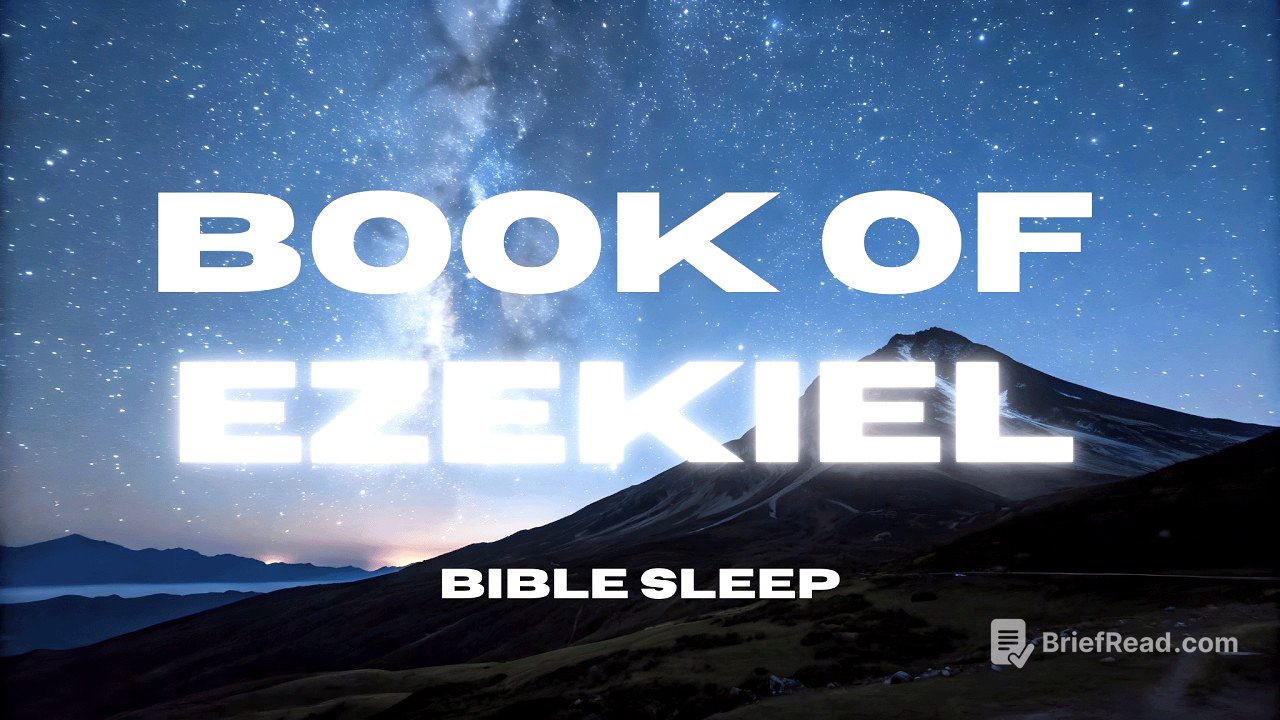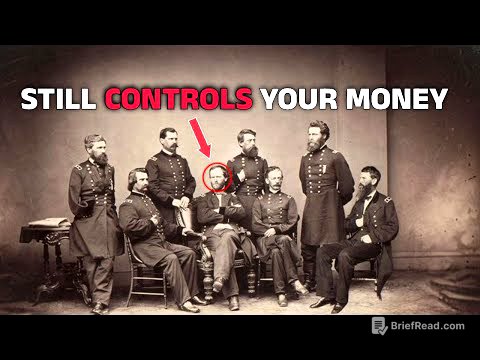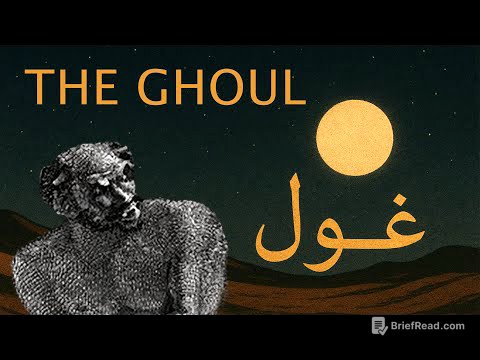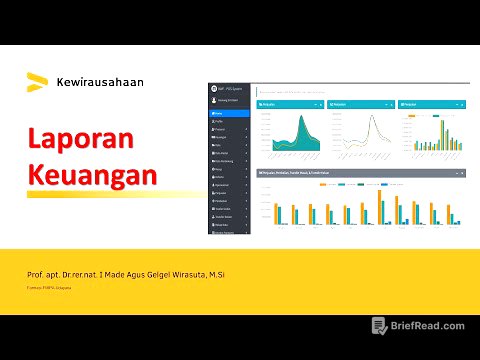TLDR;
This is a comprehensive summary of the Book of Ezekiel, detailing Ezekiel's prophetic visions, messages to the Israelites, and symbolic acts representing God's judgments and promises. It covers the destruction of Jerusalem, the sins of Israel, prophecies against neighboring nations, and visions of a restored temple and land.
- Ezekiel's visions and symbolic acts
- Prophecies of judgment and restoration
- Instructions for the new temple and worship
- Division of the land among the tribes
Ezekiel Chapter 1 [0:29]
In his 30th year, Ezekiel, among exiles by the river Kbar, experiences divine visions. During the fifth year of King Jehoakin's exile, the word of the Lord comes to Ezekiel the priest. He sees a storm from the north with an immense cloud, flashing lightning, and brilliant light, with a center like glowing metal. Within the fire, he sees four living creatures with human-like forms, each having four faces (human, lion, ox, eagle) and four wings. Their legs are straight with calf-like feet gleaming like burnished bronze, and they have human hands under their wings. The creatures move straight ahead without turning, and their wings touch each other. The appearance of the creatures is like burning coals or torches, with fire and lightning flashing among them. Ezekiel also sees a wheel on the ground beside each creature, sparkling like topaz, with each wheel intersecting another. The rims of the wheels are high, awesome, and full of eyes. The wheels move with the creatures, rising and stopping as they do, guided by the spirit within them. Above the creatures' heads is a vault like crystal, and a voice comes from above as they stand with lowered wings. Above the vault is a throne of lapis lazuli with a figure like a man, glowing with fire and surrounded by brilliant light, resembling a rainbow. This is the appearance of the glory of the Lord, causing Ezekiel to fall face down and hear a voice speaking.
Ezekiel Chapter 2 [5:41]
The voice commands Ezekiel, "Son of man, stand up on your feet and I will speak to you." As the spirit enters him, Ezekiel is raised to his feet and hears the voice saying he is being sent to the rebellious Israelites, who have revolted against God. The people are obstinate and stubborn, and Ezekiel must deliver God's words to them, whether they listen or not, so they will know a prophet has been among them. Ezekiel is told not to fear them or their words, despite being surrounded by briars, thorns, and scorpions. He must speak God's words, regardless of their reaction, and not rebel like them. He sees a hand stretched out to him with a scroll, which is unrolled to reveal words of lament, mourning, and woe written on both sides.
Ezekiel Chapter 3 [7:35]
Ezekiel is commanded to eat the scroll and then speak to the people of Israel. He eats it, and it tastes as sweet as honey. God tells him he is sent to the Israelites, not to people with obscure speech or strange languages, emphasizing that if he were sent to others, they would listen. However, the Israelites are unwilling to listen because they are unwilling to listen to God, being hardened and obstinate. God promises to make Ezekiel as unyielding and hardened as they are, with a forehead like the hardest stone, and tells him not to be afraid. He is to listen carefully and take to heart all the words spoken to him, and then go to the exiles and deliver God's message, whether they listen or not. The spirit lifts Ezekiel, and he hears a loud rumbling sound as the glory of the Lord rises, along with the sound of wings and wheels. The spirit takes him away, and he goes in bitterness and anger, with the strong hand of the Lord upon him. He arrives at Tel Aviv, where the exiles live by the river Kbar, and sits among them for seven days, deeply distressed. After seven days, the word of the Lord comes to him, appointing him as a watchman for the people of Israel, responsible for warning them of their wickedness.
Ezekiel Chapter 4 [12:58]
Ezekiel is instructed to take a block of clay and draw Jerusalem on it, then lay siege to it with siege works, a ramp, camps, and battering rams. He is to take an iron pan and place it as an iron wall between himself and the city, turning his face towards it, symbolizing the siege. He must lie on his left side to bear the sin of Israel for 390 days, and then on his right side to bear the sin of Judah for 40 days, prophesying against Jerusalem with a bared arm. He will be tied with ropes so he cannot turn until the days of the siege are finished. Ezekiel is to take wheat, barley, beans, lentils, millet, and spelt, and make bread to eat during the 390 days, weighing out 20 shekels of food each day and drinking a sixth of a hin of water at set times. He is to bake the bread using human excrement for fuel in the sight of the people, symbolizing the defiled food the Israelites will eat among the nations. When Ezekiel protests, God allows him to use cow dung instead. God declares he will cut off the food supply in Jerusalem, causing the people to eat rationed food in anxiety and drink rationed water in despair, wasting away because of their sin.
Ezekiel Chapter 5 [16:24]
Ezekiel is commanded to take a sharp sword and use it as a barber's razor to shave his head and beard, then divide the hair into three parts. One-third is to be burned inside the city, one-third struck with the sword around the city, and one-third scattered to the wind, symbolizing the fates of Jerusalem's inhabitants. A few hairs are to be tucked away in his garment, and then some of these are to be thrown into the fire, representing a fire that will spread to all Israel. God declares that Jerusalem has been set in the center of the nations but has rebelled against his laws and decrees more than the surrounding countries. Therefore, God is against Jerusalem and will inflict punishment on her in the sight of the nations. Parents will eat their children, and children will eat their parents. God will inflict punishment and scatter the survivors to the winds. Because Jerusalem has defiled the sanctuary with vile images and detestable practices, God will shave her and show no pity. One-third of the people will die of plague or famine, one-third will fall by the sword, and one-third will be scattered and pursued with a drawn sword. God's anger will cease, and his wrath will subside, and he will be avenged.
Ezekiel Chapter 6 [20:23]
Ezekiel is told to set his face against the mountains of Israel and prophesy against them, declaring that God will bring a sword against them and destroy their high places. The altars will be demolished, the incense altars smashed, and the people slain in front of their idols. The dead bodies of the Israelites will be laid before their idols, and their bones scattered around the altars. The towns will be laid waste, and the high places demolished, so that the altars will be devastated, the idols smashed, and what they have made wiped out. The people will fall slain among them, and they will know that God is the Lord. However, God will spare some, and those who escape the sword will remember him in the nations where they are carried captive. They will loathe themselves for their evil and detestable practices and know that God is the Lord, who did not threaten in vain to bring this calamity upon them. Ezekiel is told to strike his hands together, stamp his feet, and cry out "Alas!" because of the wicked and detestable practices of the people of Israel, who will fall by the sword, famine, and plague.
Ezekiel Chapter 7 [23:29]
Ezekiel relays the message that the end has come upon the land of Israel. God will unleash his anger, judge their conduct, and repay them for their detestable practices without pity. Disaster, an unheard-of disaster, is coming, rousing itself against them. Doom has come upon the inhabitants of the land, and the time is near, bringing panic, not joy, on the mountains. God will pour out his wrath, judge their conduct, and repay their detestable practices without pity. Violence has arisen as a rod to punish the wicked, leaving none of the people, their crowd, their wealth, or anything of value. The time has come, and the day has arrived. The seller will not recover the property that was sold, and no one will preserve their life. Though the trumpet is blown and all things are ready, no one will go into battle, for God's wrath is on the whole crowd. Outside is the sword, and inside are plague and famine. Those in the country will die by the sword, and those in the city will be devoured by famine and plague. Fugitives will flee to the mountains, moaning for their sins. Every hand will go limp, and every leg will be wet with urine. They will put on sackcloth and be clothed with terror. They will throw their silver into the streets, and their gold will be treated as a thing unclean, unable to deliver them in the day of God's wrath.
Ezekiel Chapter 8 [28:54]
In the sixth year, Ezekiel is sitting in his house with the elders of Judah when the hand of the Lord comes upon him. He sees a figure like a man, with fire from the waist down and glowing metal from there up. The figure stretches out a hand and takes Ezekiel by the hair, and the Spirit lifts him between earth and heaven, taking him in visions of God to Jerusalem, to the north gate of the inner court, where the idol that provokes jealousy stands. There, Ezekiel sees the glory of the God of Israel, as in the vision he had seen in the plain. God tells him to look towards the north, where Ezekiel sees the idol of jealousy in the entrance north of the altar gate. God asks if he sees the detestable things the Israelites are doing, things that will drive him far from his sanctuary, and says he will see even more detestable things. He is brought to the entrance of the court and sees a hole in the wall, which he digs into to find a doorway. God tells him to go in and see the wicked things they are doing. Inside, Ezekiel sees portrayals of crawling things, unclean animals, and all the idols of Israel over all the walls. Seventy elders of Israel stand in front of them, each with a sensor in his hand, and a fragrant cloud of incense is rising.
Ezekiel Chapter 9 [33:03]
Ezekiel hears God call out in a loud voice to bring near those appointed to execute judgment on the city, each with a weapon in his hand. Six men come from the direction of the upper gate facing north, each with a deadly weapon, and with them is a man clothed in linen with a writing kit at his side. They stand beside the bronze altar. The glory of God goes up from above the cherubim and moves to the threshold of the temple. God calls to the man in linen and tells him to go throughout Jerusalem and put a mark on the foreheads of those who grieve and lament over all the detestable things done in it. To the others, God commands them to follow him through the city and kill without pity or compassion, slaughtering old men, young men, women, mothers, and children, but not touching anyone with the mark, beginning at the sanctuary. They begin with the old men in front of the temple. God tells them to defile the temple and fill the courts with the slain. They go out and begin killing throughout the city. Ezekiel, left alone, falls face down, crying out to God not to destroy the entire remnant of Israel. God answers that the sin of the people is exceedingly great, the land is full of bloodshed, and the city is full of injustice. They say, "The Lord has forsaken the land; the Lord does not see." God will not look on them with pity or spare them but will bring down on their own heads what they have done. The man in linen returns, saying he has done as commanded.
Ezekiel Chapter 10 [35:45]
Ezekiel sees the likeness of a throne of Lapis Lazuli above the vault over the heads of the cherubim. The Lord commands the man clothed in linen to go in among the wheels beneath the cherubim, fill his hands with burning coals from among them, and scatter them over the city. The cherubim are standing on the south side of the temple, and a cloud fills the inner court. The glory of the Lord rises from above the cherubim and moves to the threshold of the temple. The cloud fills the temple, and the court is full of the radiance of the glory of the Lord. The sound of the wings of the cherubim can be heard as far away as the outer court, like the voice of God Almighty. When the Lord commands the man in linen to take fire from among the wheels and cherubim, the man goes in and stands beside the wheel. One of the cherubim reaches out his hand to the fire, takes some of it, and puts it into the hands of the man in linen, who takes it and goes out. Under the wings of the cherubim can be seen what looks like human hands. Ezekiel sees four wheels beside the cherubim, each like a wheel intersecting a wheel, sparkling like topaz. As they move, they go in any of the four directions the cherubim face, without turning. Their entire bodies, including their backs, hands, and wings, are completely full of eyes, as are their four wheels. Each cherub has four faces: one of a cherub, one of a human, one of a lion, and one of an eagle. The cherubim rise upward, and when they move, the wheels beside them move. When the cherubim spread their wings to rise, the wheels do not leave their side. The glory of the Lord departs from over the threshold of the temple and stops above the cherubim. The cherubim spread their wings and rise from the ground, with the wheels going with them. They stop at the entrance of the east gate of the Lord's house, and the glory of the God of Israel is above them.
Ezekiel Chapter 11 [39:48]
The spirit lifts Ezekiel and brings him to the gate of the Lord's house that faces east, where he sees 25 men, including Jazaniah and Pelletiah, leaders of the people. God tells Ezekiel that these men are plotting evil and giving wicked advice in the city, saying it is a pot and they are the meat in it. Therefore, Ezekiel must prophesy against them. The spirit of the Lord comes upon Ezekiel, and he tells them that God knows what is going through their minds: they have killed many people and filled the streets with the dead. God declares that the bodies they have thrown there are the meat, and the city is the pot, but he will drive them out of it. They fear the sword, and the sword is what God will bring against them. He will drive them out of the city, deliver them into the hands of foreigners, and inflict punishment on them at the borders of Israel. They will know that God is the Lord, for they have not followed his decrees or kept his laws but have conformed to the standards of the nations around them. As Ezekiel prophesies, Pelletiah dies. Ezekiel falls face down and cries out to God not to destroy the remnant of Israel completely. God tells him that the people of Jerusalem have said of the exiles, "They are far away from the Lord; this land was given to us as our possession." Therefore, Ezekiel must say that although God sent them far away, he has been a sanctuary for them in the countries where they have gone. God will gather them from the nations and bring them back from the countries where they have been scattered, giving them back the land of Israel. They will return to it and remove all its vile images and detestable idols. God will give them an undivided heart and put a new spirit in them, removing their heart of stone and giving them a heart of flesh. Then they will follow his decrees and be careful to keep his laws, and they will be his people, and he will be their God. But as for those whose hearts are devoted to their vile images and detestable idols, God will bring down on their heads what they have done. The cherubim spread their wings, and the glory of God goes up from within the city and stops above the mountain east of it. The spirit lifts Ezekiel and brings him to the exiles in Babylonia in a vision, and he tells them everything God has showed him.
Ezekiel Chapter 12 [44:01]
Ezekiel is told that he lives among a rebellious people who have eyes to see but do not see, and ears to hear but do not hear. Therefore, he must pack his belongings for exile and set out during the daytime as they watch, going from where he is to another place, so they might understand. He must bring out his belongings packed for exile during the daytime and then, in the evening, go out like those who go into exile, digging through the wall and carrying his belongings out at dusk, covering his face so he cannot see the land, for he has been made a sign to the Israelites. Ezekiel does as he is commanded. In the morning, God asks if the Israelites asked him what he was doing, and tells him to say that this prophecy concerns the prince in Jerusalem and all the Israelites who are there. As Ezekiel has done, so it will be done to them: they will go into exile as captives. The prince will put his things on his shoulder at dusk and leave through a hole dug in the wall, covering his face so he cannot see the land. God will spread his net for him, and he will be caught in his snare, brought to Babylonia, but he will not see it, and there he will die. God will scatter to the winds all those around him, his staff and all his troops, and pursue them with a drawn sword. They will know that God is the Lord when he disperses them among the nations and scatters them through the countries. But God will spare a few of them from the sword, famine, and plague, so that in the nations where they go, they may acknowledge all their detestable practices and know that God is the Lord. Ezekiel is told to tremble as he eats his food and shudder in fear as he drinks his water, and to say to the people of the land that they will eat their food in anxiety and drink their water in despair, for their land will be stripped of everything in it because of the violence of all who live there. The inhabited towns will be laid waste, and the land will be desolate. Then they will know that God is the Lord.
Ezekiel Chapter 13 [49:03]
Ezekiel is instructed to prophesy against the prophets of Israel who prophesy out of their own imagination, following their own spirit and seeing nothing. They are like jackals among ruins, not repairing the breaches in the wall for the people of Israel. Their visions are false, and their divinations are lies, yet they say, "The Lord declares," even though the Lord has not sent them. Because of their false words and lying visions, God is against them and will exclude them from the council of his people, the records of Israel, and the land of Israel. They lead people astray, saying, "Peace," when there is no peace, and when a flimsy wall is built, they cover it with whitewash. Therefore, God will unleash a violent wind, hailstones, and torrents of rain to tear down the wall and destroy those who covered it with whitewash. Ezekiel is also told to set his face against the daughters of his people who prophesy out of their own imagination, and to say, "Woe to the women who sew magic charms on all their wrists and make veils of various lengths for their heads in order to ensnare people." They ensnare the lives of God's people but preserve their own, profaning God for a few handfuls of barley and scraps of bread, killing those who should not have died and sparing those who should not live. Therefore, God is against their magic charms and will tear them from their arms, setting free the people they ensnare like birds. They will no longer see false visions or practice divination, and God will save his people from their hands. Then they will know that God is the Lord.
Ezekiel Chapter 14 [53:56]
Some of the elders of Israel come to Ezekiel and sit before him. God tells Ezekiel that these men have set up idols in their hearts and put wicked stumbling blocks before their faces, and asks if he should let them inquire of him at all. Therefore, Ezekiel must speak to them and say that when any of the Israelites set up idols in their hearts and put a wicked stumbling block before their faces and then go to a prophet, God will answer them himself in keeping with their great idolatry, to recapture the hearts of the people of Israel who have deserted him for their idols. Ezekiel must tell the people of Israel to repent, turn from their idols, and renounce all their detestable practices. When any of the Israelites or any foreigner residing in Israel separate themselves from God, set up idols in their hearts, put a wicked stumbling block before their faces, and then go to a prophet to inquire of God, God will answer them himself. He will set his face against them and make them an example and a byword, removing them from his people. Then they will know that God is the Lord. If the prophet is enticed to utter a prophecy, God has enticed that prophet, and he will stretch out his hand against him and destroy him from among his people, Israel. They will bear their guilt, and the prophet will be as guilty as the one who consults him. Then the people of Israel will no longer stray from God, nor will they defile themselves anymore with all their sins. They will be his people, and he will be their God.
Ezekiel Chapter 15 [58:46]
Ezekiel questions how the wood of a vine is different from any other tree in the forest, asking if it is ever used to make anything useful or even pegs to hang things on. After it is thrown on the fire and charred, is it then useful for anything? If it was not useful when whole, how much less can it be made into something useful when the fire has burned it? Therefore, God says that as he has given the wood of the vine among the trees of the forest as fuel for the fire, so will he treat the people living in Jerusalem. He will set his face against them, and although they have come out of the fire, the fire will yet consume them. When he sets his face against them, they will know that he is the Lord. God will make the land desolate because they have been unfaithful.
Ezekiel Chapter 16 [1:00:12]
Ezekiel is instructed to confront Jerusalem with her detestable practices, telling her that her ancestry and birth were in the land of the Canaanites, her father was an Amorite, and her mother a Hittite. On the day she was born, her cord was not cut, nor was she washed, rubbed with salt, or wrapped in cloths. No one looked on her with pity or had compassion enough to do any of these things for her. Rather, she was thrown out into the open field, for on the day she was born, she was despised. Then God passed by and saw her kicking about in her blood, and said to her, "Live." He made her grow like a plant of the field, and she grew and developed and entered puberty. Her breasts had formed, and her hair had grown, yet she was stark naked. Later, God passed by and saw that she was old enough for love, so he spread the corner of his garment over her and covered her naked body. He gave her his solemn oath and entered into a covenant with her, and she became his. God bathed her with water, washed the blood from her, and put ointments on her. He clothed her with an embroidered dress and put sandals of fine leather on her. He dressed her in fine linen and covered her with costly garments. He adorned her with jewelry, putting bracelets on her arms and a necklace around her neck. He put a ring on her nose, earrings on her ears, and a beautiful crown on her head. So she was adorned with gold and silver, and her clothes were of fine linen and costly fabric and embroidered cloth. Her food was honey, olive oil, and the finest flour. She became very beautiful and rose to be a queen. Her fame spread among the nations on account of her beauty because the splendor God had given her made her beauty perfect.
Ezekiel Chapter 17 [1:12:43]
Ezekiel is instructed to set forth an allegory and tell it to the Israelites as a parable. A great eagle with powerful wings, long feathers, and full plumage of varied colors came to Lebanon, broke off the top of a cedar, and carried it to a land of merchants, planting it in a city of traders. He took one of the seedlings of the land and put it in fertile soil, planting it like a willow by abundant water, and it sprouted and became a low-spreading vine. Its branches turned towards him, but its roots remained under it, so it became a vine and produced branches and leafy boughs. But there was another great eagle with powerful wings and full plumage. The vine now sent out its roots towards him from the plot where it was planted and stretched out its branches to him for water. It had been planted in good soil by abundant water so that it would produce branches, bear fruit, and become a splendid vine. God asks if it will thrive, or if it will be uprooted and stripped of its fruit so that it withers, and if all its new growth will wither. It will not take a strong arm or many people to pull it up by the roots. It has been planted, but will it thrive? Will it not wither completely when the east wind strikes it, withering away in the plot where it grew? God asks if they do not know what these things mean, and says that the king of Babylon went to Jerusalem and carried off her king and her nobles, bringing them back with him to Babylon. Then he took a member of the royal family and made a treaty with him, putting him under oath. He also carried away the leading men of the land so that the kingdom would be brought low, unable to rise again, surviving only by keeping his treaty. But the king rebelled against him by sending his envoys to Egypt to get horses and a large army. God asks if he will succeed, if he who does such things will escape, and if he will break the treaty and yet escape.
Ezekiel Chapter 18 [1:17:52]
Ezekiel questions the proverb about the parents eating sour grapes and the children's teeth being set on edge, declaring that everyone belongs to God, the parent as well as the child, and the one who sins is the one who will die. He describes a righteous man who does what is just and right, does not eat at the mountain shrines or look to idols, does not defile his neighbor's wife or have relations with a woman during her period, does not oppress anyone but returns what he took in pledge, does not commit robbery but gives food to the hungry and provides clothing for the naked, does not lend at interest or take a profit, withholds his hand from doing wrong, judges fairly, and follows God's decrees and laws. That man is righteous and will surely live. Then he describes a violent son who sheds blood or does any of these other things, though the father has done none of them. He eats at the mountain shrines, defiles his neighbor's wife, oppresses the poor, commits robbery, does not return what he took in pledge, looks to idols, does detestable things, and lends at interest. Will such a man live? He will not, because he has done all these detestable things and will be put to death, his blood on his own head. But suppose this son has a son who sees all the sins his father commits, and though he sees them, he does not do such things. He does not eat at the mountain shrines or look to idols, does not defile his neighbor's wife, does not oppress anyone or require a pledge, does not commit robbery, but gives food to the hungry and provides clothing for the naked, withholds his hand from ill-treating the poor, takes no interest or profit, and keeps God's laws. He will not die for his father's sin but will surely live.
Ezekiel Chapter 19 [1:24:26]
Ezekiel is instructed to take up a lament concerning the princes of Israel, comparing their mother to a lioness among lions who reared her cubs. She brought up one cub, and he became a strong lion, learning to tear prey and becoming a man-eater. The nations heard about him, and he was trapped in their pit, led with hooks to Egypt. When she saw her hope unfulfilled, she took another cub and made him a strong lion. He prowled among the lions, learned to tear prey, and became a man-eater. He broke down strongholds and devastated towns, terrifying the land. Then the nations came against him, spread their net, and trapped him. With hooks, they pulled him into a cage and brought him to the king of Babylon, putting him in prison so his roar was heard no longer on the mountains of Israel. Ezekiel compares the mother to a vine in a vineyard planted by the water, fruitful and full of branches because of abundant water. Its branches were strong, fit for a ruler's scepter, towering high above the foliage. But it was uprooted in fury and thrown to the ground, shriveling in the east wind, stripped of its fruit, and its strong branches withered and consumed by fire. Now it is planted in the desert in a dry and thirsty land. Fire spread from one of its main branches and consumed its fruit, leaving no strong branch fit for a ruler's scepter. This is a lament and is to be used as a lament.
Ezekiel Chapter 20 [1:26:52]
In the seventh year, some of the elders of Israel come to inquire of the Lord, and Ezekiel is told to confront them with the detestable practices of their ancestors. God recounts how he chose Israel, swore to the descendants of Jacob, and revealed himself in Egypt, declaring himself as their God. He swore to bring them out of Egypt into a land flowing with milk and honey, the most beautiful of all lands, and commanded them to get rid of their vile images and not defile themselves with the idols of Egypt. But they rebelled and would not listen, so God said he would pour out his wrath on them in Egypt. However, for the sake of his name, he brought them out of Egypt to keep his name from being profaned. He led them into the wilderness, gave them his decrees and laws, and gave them his Sabbaths as a sign between them, so they would know that he made them holy. Yet the people of Israel rebelled in the wilderness, rejecting his decrees and desecrating his Sabbaths, so God said he would pour out his wrath on them and destroy them in the wilderness. But for the sake of his name, he did what would keep it from being profaned. He swore to them that he would not bring them into the land he had given them because they rejected his laws, did not follow his decrees, and desecrated his Sabbaths, for their hearts were devoted to their idols.
Ezekiel Chapter 21 [1:37:18]
Ezekiel is instructed to set his face against Jerusalem and preach against the sanctuary, prophesying against the land of Israel. God declares he is against them and will draw his sword to cut off both the righteous and the wicked, so his sword will be unsheathed against everyone from south to north. Then all people will know that God has drawn his sword from its sheath, and it will not return again. Therefore, Ezekiel must groan before them with a broken heart and bitter grief, and when they ask why he is groaning, he shall say it is because of the news that is coming. Every heart will melt with fear, every hand will grow limp, every spirit will become faint, and every leg will be wet with urine. It is coming, and it will surely take place. Ezekiel is told to prophesy and say that a sword is sharpened and polished for slaughter, to flash like lightning. He must cry out and wail, for it is against God's people and all the princes of Israel, who are thrown to the sword along with his people. Therefore, he must beat his breast. Testing will surely come, and what if even the scepter which the sword despises does not continue? Ezekiel must prophesy and strike his hands together, letting the sword strike twice, even three times, for it is a sword for great slaughter, closing in on them from every side, so that hearts may melt with fear, and the fallen be many. God has stationed the sword for slaughter at all their gates, forged to strike like lightning, grasped for slaughter.
Ezekiel Chapter 22 [1:43:58]
Ezekiel is asked if he will judge the city of bloodshed and is told to confront her with all her detestable practices. God says that the city brings on herself doom by shedding blood and defiles herself by making idols, becoming guilty because of the blood she has shed and defiled by the idols she has made. She has brought her days to a close and the end of her years has come. Therefore, God will make her an object of scorn to the nations and a laughingstock to all the countries. Those who are near and those who are far away will mock her, this infamous city full of turmoil. Each of the princes of Israel uses his power to shed blood, treating father and mother with contempt, oppressing the foreigner, and ill-treating the fatherless and the widow. They despise God's holy things and desecrate his Sabbaths. There are slanderers who are bent on shedding blood, those who eat at the mountain shrines and commit lewd acts, those who dishonor their father's bed, those who violate women during their period, one man who commits a detestable offense with his neighbor's wife, another who shamefully defiles his daughter-in-law, and another who violates his sister. There are people who accept bribes to shed blood, take interest and make a profit from the poor, and extort unjust gain from their neighbors, forgetting God. Therefore, God will strike his hands together at the unjust gain they have made and at the blood they have shed. Will their courage endure or their hands be strong in the









